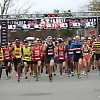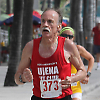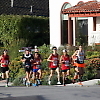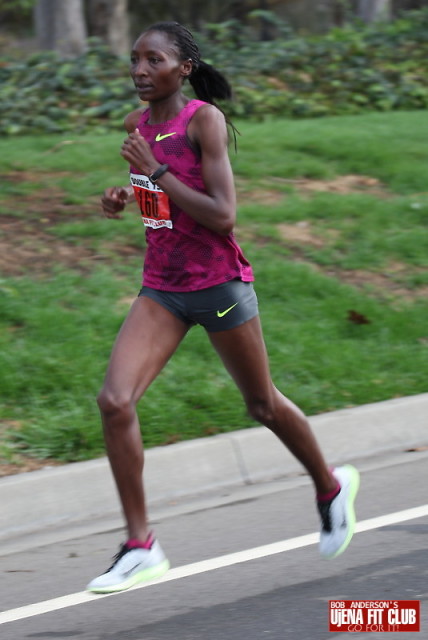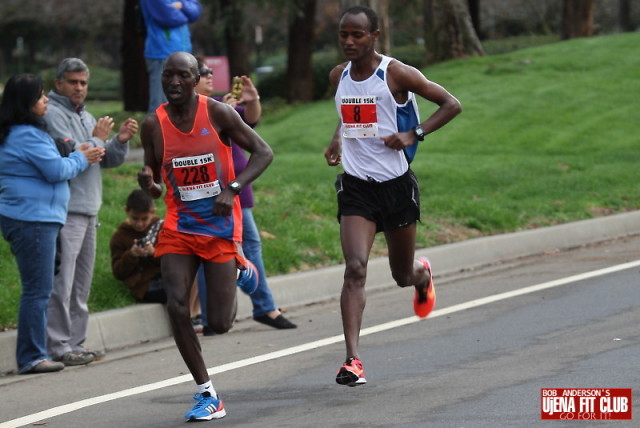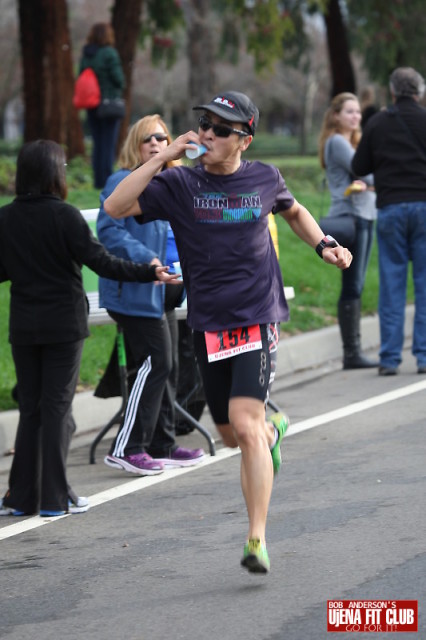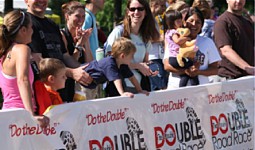UjENA FIT Club 100 Interesting Running Articles
Best Road Races and the UjENA FIT Club is publishing 100 articles about races, training, diet, shoes and coaching. If you would like to contribute to this feature, send an email to Bob Anderson at bob@ujena.com . We are looking for cutting edge material.
Click here to read all Running Articles
Posted Wednesday, February 11th, 2015
By David Prokop Pleasanton, Calif., may be a quiet, relaxed community across the bay from San Francisco, but where Double... Read Article
Posted Monday, September 15th, 2014
Peter Mullin has taken Double Racing® by storm. He broke the 60-64 age group world record in the first Double... Read Article
Posted Monday, September 22nd, 2014
by David Prokop (Editor Best Road Races) Photo: Double 15k top three Double Racing® is a new sport for... Read Article
Posted Sunday, May 11th, 2014
By David Prokop, editor Best Road Races The world’s most unusual race met the world’s most beautiful place, in the... Read Article
Pleasanton: The Masters of Double Racing
Wednesday, February 11th, 2015
What the Masters is to golf, Pleasanton is to Double Racing, and at the third annual Pleasanton Double Racing® Festival in Pleasanton, Calif., last December 21, Kenya’s Risper Gesawba met her objective – in her own words! – of mastering the Double
By David Prokop Pleasanton, Calif., may be a quiet, relaxed community across the bay from San Francisco, but where Double Racing® is concerned, this is where all the excitement started, where Double Racing® officially made its debut – on Dec. 23, 2012. Like the Masters tournament in golf, Pleasanton is the Double Racing® event steeped in the most tradition. The sport not only started here, but this is where the course is so fast, flat and smooth, with interesting twists and turns, it fairly invites competitors of all abilities to shoot for their best times. This is the place where more world records in the Double 15K (10K + 5k), the signature event in the sport, have been set than anywhere else. This is where the greatest number of competitors each year turn out for the Double. This is Ground Zero of Double Racing®, the place from which everything else in the sport has sprung and come to fruition. On Dec. 21 of last year, at the third annual Pleasanton Double Racing® Festival, Pleasanton was also the place where Risper Gesabwa, a leggy, 25-year-old transplanted Kenyan who now lives in Atlanta, Ga., which coincidentally is not far from where the Masters golf tournament is held, improved the women’s world record for the Double 15K by an astonishing three minutes, 28 seconds! She posted an aggregate time of 48:45.2, running the 10K in 32:55.6 and the 5K in 15:49.6, to set what is arguably the most impressive record in the history of Double Racing®. In the process she outran U.S. Olympian Kim Conley, no slouch as a runner herself. The previous women’s world record of 52:13 had been set seven months earlier by Molly Pritz in Pacific Grove, Calif., when she ran the 10K in 34:39 and the 5K in 17:34. As a result of Gesabwa’s blockbuster performance in Pleasanton, both the men’s and women’s world records in the Double 15K now belonged to Kenyans. Julius Koskei, holder of the men’s world record of 44:24.01 (29:45.20/14:38.81), set in Pleasanton a year earlier, competed in the men’s race on Dec. 21, but despite leading both the 10K and 5K stages most of the way, he was not at his best due to a bad cold and Ethiopia’s Tesfaye Alemayehu was clearly stronger over the last mile of each leg, winning with an aggregate time of 45:05.7 (30:07.5/14:58.2). Koskei would finish second in 45:51.2 (30:46.2/15:04.9). Christine Kennedy of Los Gatos, Calif., all 5’1”, 98 pounds of her, won the women’s Masters division (40 and over) at Pleasanton – at age 59! Not surprisingly, she also won the prestigious Double Victory Cup for the best age-graded performance in the race as she ran the 10K in 39:51.1 and the 5K in 19:50.5 for an aggregate time of 59:41.6 and an age-graded score of 98.4. The Pleasanton Double 15K would, in fact, be Kennedy’s last race as a 59-year-old (she turned 60 only eight days later). Then this superb Masters runner, who had won the Double Victory Cup in nine of the 10 Doubles she’d competed in up to that point, would embark on a campaign in 2015 to rewrite the 60 and over record book for women at every distance from the 5K to the marathon. No less an observer of the running scene than Bob Anderson, who founded Runner’s World magazine and created the sport of Double Racing®, would say later: “I have no doubt she’ll prove herself the fastest 60 and over female runner we’ve ever had just like she proved herself the fastest 57-, 58- and 59-year old female runner ever. She’s amazing!”
Risper en route to a new world record for the Double Road Race. Speaking of amazing, that term certainly applied to what Risper Gesabwa, who’s 5’7”, 110 pounds and originally from Kisii, Kenya, did in Pleasanton. She first heard of the Double 15K from Bob Anderson way back in July of 2012, months before the inaugural Double Road Race® was held in Pleasanton, but she had never run the Double until Pleasanton this last December. Going into the race, Gesabwa had a clear objective and a bit of trepidation. “My strategy was to master the Double Road Race® and to go under 50 (minutes) – and I did,” she said afterwards. “For me it was so exciting because it was my first time to run the Double and Bob told me there was a competitor in the race (Kim Conley) who had run in the Olympics, so I was scared. When you run against someone like that, you’ve got to be scared, because you don’t know how it will be – how you will start and how you will finish. And when you run with Olympic athletes and do well, it shows you if you train hard maybe you can go to the Olympics, too.” The way Gesabwa ran in Pleasanton, it’s the other runners who needed to be scared of her. She and Conley stayed together for the first mile of the 10K, then, as Gesabwa explained, “I started to push, and when I looked behind, I found I was alone. So I just kept going to try to build as big a lead as possible.” She finished the 10K in 32:55.6 -- she has a personal best in the 10K of 31:41, but that was in a straight race where she didn’t have to come back and run a 5K. The 32:55.6 put her in the leader’s yellow jersey going into the 5K and gave her a lead of 39 seconds over Conley, which meant the race was now essentially hers. It also meant she was way ahead of the women’s world record pace for the Double 15K, but there was still the 5K to run and the concluding leg is always something of an unknown in Double Racing®. The recovery break, also called the Halftime, in the Double is a time for recovery, camaraderie, preparation, and a myriad of considerations -- if you’re really looking to do your best! For Risper Gesabwa, there was only one consideration during the recovery break at Pleasanton – stay in The Zone, a term serious competitive athletes well understand. She was so focused during the recovery break that she remained the picture of total concentration, almost as if she was in a kind of meditative trance. She didn’t talk to people or interact with anybody. Rather, she was all business, thinking only of doing her best in the concluding 5K and thus finish what she had started by running so fast in the 10K! She knew she was halfway there to setting a spectacular world record; moreover, there was a $1000 bonus on the line if she could get under 49 minutes on aggregate time. Undoubtedly, the focused attitude was also borne out of a certain anxiety that, by her own admission, she couldn’t be sure how much energy she had left or how she would do in the 5K. Facing that reality and needing to martial all her energy, both physical and mental, she could be excused if she remained focused and deadly serious throughout the recovery break. All too soon, it was time to toe the starting line again… Gesabwa said later, “For the 5K I wasn’t sure what time I would run – maybe 16:50 – because I didn’t know how I would feel. When we started, we started at a very high speed. At first she (Conley) got a lead on me (maybe 30-40 meters), but then I closed the gap and by the end of the first mile I had caught her. When I caught her, I felt comfortable because now I thought, ‘Maybe I can run a good 5K.’ I wasn’t as uncertain as I had been at the start.” The two of them then burned up the road, running shoulder to shoulder, until the very end of the 4K when the American, with her superior finishing speed, sprinted to edge her Kenyan rival 15:49.2 to 15:49.6. However, Gesabwa had more than enough of a time advantage in hand to win on aggregate time -- and win convincingly. Thus was a new Pleasanton champion crowned and a new women’s world record set – and what a record! Without a doubt, Risper Gesabwa had every reason to be happy about winning in Pleasanton because her victory, the new world record and going under 49 minutes netted her the single biggest payday in the history of Double Racing® -- $2,100! This was the first time that time bonuses were available in the Double and Gesabwa received $1,000 alone for breaking 49 minutes. On analysis, it’s clear that Risper Gesabwa ran a truly superb Double in Pleasanton! You’ve heard of a tour de force; hers was a tour de Double. Consider that she placed fifth overall in the race – and was only two minutes, 39 seconds slower than the third-place finisher in the men’s race, Jovanny Godinez, who was impressive in his own right, outrunning two world-class runners (Julius Koskei and Tesfaye Alemayehu) in the concluding 5K! The quality of Gesabwa’s performance is further illustrated by the fact that she ran the 10K in 5:18 per mile pace while the top three men ran 4:51, 4:57 and 5:01 pace. In the 5K she ran 5:06 per mile while the top three men ran 4:49, 4:51 and 4:49. Considering that we’re comparing male and female performances, these are really infinitisimal differentials, and they underline how brilliant the young Kenyan was on the day. Not to be overlooked is that the runner Gesabwa defeated in Pleasanton, Kim Conley, the attractive 28-year-old from Sacramento, Calif., who represented the U.S. in the 5000 meters at the 2012 London Olympics and is now making a very successful transition to road running, has some pretty glittering credentials of her own. So glittering many thought she would win the race. It didn’t happen, and Conley later said, “I’m preparing for the U.S. Half-Marathon Championships in Houston, so I came here to rehearse. I wanted to approach the 10K by running at a half-marathon effort (or pace) and then just see what I could do in the 5K on tired legs. She (Gesabwa) actually ran ideally what I’d have liked to run (in the 10K) – around 33 minutes – so I was definitely a little disappointed to have her break me in the 10K like that and then not be able to make up that ground again. But overall I still felt like I got what I needed out here today, so I’m happy with that. But I’m competitive, and she got me today.” Comments and Feedback
 Lots of PR's at the 3rd Annual Pleasanton Double Road Race. World record times! Fast fun course! Mark your calendar Dec 20, 2015. Lots of PR's at the 3rd Annual Pleasanton Double Road Race. World record times! Fast fun course! Mark your calendar Dec 20, 2015. Bob Anderson 2/12/15 9:03 am |
,,,,, |
As it is, Conley and her Sacramento teammates Alycia Cridebring, 22, and Rachel Mitchell, 23, produced a tremendous 1-2-3 punch in Pleasanton, all three of them also bettering the previous women’s world record in the Double 15K, to easily win the women’s team competition in the event. Yes, a team competition is very much part of Double Racing® as well. It’s very much like adding a cross-country scoring element to road racing. And why not? Not only a perfectly valid idea, but perhaps one long overdue. Conley ran 49:24.0 (33:34.8/15:49.2), Cridebring 51:24.4 (34:14.5/ 17:09.8), and Mitchell 51:50 (34:48.9/17:02.0). Again, the previous world record had been 52:13. A month later, on Jan. 18, Kim Conley was an impressive women’s winner in the U.S. Half-Marathon Championships in Houston, Tex., running strongly from the start and then powering away over the last 5K to win by 32 seconds in a time of 1:09:44. If that pattern sounds similar to the way she ran in Pleasanton, you might find it interesting to know that a few days after her victory in Houston, she e-mailed Bob Anderson and said, in part, “I just wanted to say thanks for creating a great event in the Double Road Race®. After my half-marathon on Sunday, one of my first thoughts was how well the Double prepared me for it. The half played out very similar to my approach in the Double … 5:23ish pace and letting it rip in the final 5K.”
The battle up front between Julius and Tesfaye. Strategy wasn’t the issue for Kenya’s Julius Koskei, health was! The holder of the men’s world record in the Double 15K – the 44:24:01 as previously mentioned – Koskei (pronounced Kos-kay) was back to have another go at it on the very course where he had set the record the previous year, but a cold had left him in a weakened state. Before the race, Koskei, one of the nicest sportsmen you’ll ever meet, told his main rival, Ethiopia’s Tesfaye Alemayehu (Al-a-my-oh), who had been second to him when Koskei set the record, “This time I am not so strong.” Alemayehu, a 5’9”, 125-pound Ethiopian who’s originally from Addis Ababa but now lives in Antioch, Calif., in the San Francisco Bay area, could have taken this as a signal he should push a hard pace in order to simply overwhelm Koskei and perhaps go after his world record. But instead he chose to run a strategic race, being content to follow as Koskei, 32, led the first five miles of the opening 10K. Then the taller Ethiopian (Koskei is only 5’5”), surged past so fast, all Koskei could do was hold on as best he could as Alemayehu, who’s 29, opened a gap of almost 40 seconds on him over the last 1¼ miles. They finished in 30:07.5 and 30:46.2 respectively. In the concluding 5K after the recovery break, Koskei felt well recovered despite his cold and his earlier effort, so he went in front again, just in case he could somehow make up the lost time. But he soon realized there was no way that was going to happen because Alamayehu still looked strong. Then at two miles, an unheralded young American, Jovanny Godinez, 23, of Hayward, Calif., who had run the 10K in 31:10, shot into the lead – with a vengeance! “We didn’t know he could run a 5K like that!” Koskei said in admiration and surprise afterwards. Alemayehu went with Godinez; Koskei was suddenly left adrift on his own. Over the final mile, Alemayehu, his victory on aggregate time now assured, stayed right with Godinez, but the American refused to be overtaken and at the finish he had a few yards in hand as they clocked 14:56.7 and 14:58.2 respectively. Koskei finished the 5K in 15:04.9. Alemayehu had won in impressive fashion but Koskei’s record had survived, and afterwards Koskei opined that if Alemayehu had really run aggressively from the gun, instead of choosing to follow, he might indeed have broken the record or at least threatened it. There was, however, more to the story than people knew, as some weeks later Alemayehu revealed that he wasn’t at his 100 percent best for the race either – he’d been dealing with lingering stiffness and pain in his left hamstring, thigh and hip. Although the problem wasn’t as bad as the previous year when Koskei had beaten him, it was significant enough to dictate a strategy of caution. He explained later, “I was dealing with my injury, so I just followed him.” Therefore, even though Alemayehu was obviously stronger than Koskei last December in Pleasanton, any attempt on the men’s world record by him would have to wait till another day. Koskei and Alemayehu are truly wonderful runners, friends as well as rivals, and rather evenly matched – Koskei has run 2:10:15 for the marathon and 1:01:15 for the half-marathon; Alemayehu has run 2:11:18 and 1:01:35. This time Koskei lost, but he retained his world record, and afterwards he said philosophically, “It’s hard to be very fast all the time.” There were many other impressive performances in Pleasanton in addition to the heroics provided by Gesabwa, Conley, Alemayehu, Koskei, Godinez, Kennedy and company. A young Swedish runner, 19-year-old Anders Fox, who was on a two-week vacation in the U.S., set a new world 19 and under men’s record for the Double 15K as he posted an aggregate time of 48:51.0 (32:53.0/15:58.0) to break the previous world record of 50:47 held by Jose Pina, Jr., of San Jose, Calif. Young Pina, who’s only 17, was also in the race, but this time he finished as the runner-up with a combined time of 49:13.7 (33:01.7/16:12.0). He’ll still have two years to recapture the 19 and under record. Also on the program at the third annual Pleasanton Double Racing® Festival were a Double 8K (5K + 3K) and a Kids’ Cup 1½ Mile (1 mile + half-mile). Nicholas Spector, 23, of Sonoma, Calif., and Ivan Medina, 28, of Hayward. Calif., made an exciting battle out of it in the Double 8K, running 16:02.6 and 16:03.7 in the opening 5K leg. However, in the concluding 3K, Spector prevailed by an even 10 seconds, running 8:30.0 compared to Medina’s 8:40.0, to win on aggregate time, 24:32.6 to 24:43.7. The women’s winner in the Double 8K was Andrea Page, 38, of Pacific Grove, Calif., who ran the 5K in 20:28.4 and the 3K in 11:00 for a combined time of 31:28.4. Finally, the Bob Anderson Kids’ Cup Double 1½ Mile was won by Omar Pina, 13, of San Jose, who ran the mile in 5:10 (remember, this is a 13-year-old!) and the half-mile in 2:42 for a combined time of 7:52. Omar is the younger brother of Jose Pina, Jr. Their father, Jose Pina, Sr., ran the Double 15K at Pleasanton, as did Jose Jr., and finished second in the men’s 40-45 age group with an aggregate time of 51:37.6 (34:34.9/17:02.7). Natalie Mazaud, 12, of Carmel, Calif., was the girl’s winner in the Kids’ Cup Double 1½ Mile as she ran the mile in 5:56.3 and the half-mile in 3:02.1 for an aggregate time of 8:58.5. There were a total of 846 registered runners in the three races at the third annual Pleasanton Double Racing® Festival, the highest total in a Double Racing® competition yet. A sport that some initially might have thought was some kind of fad or gimmick is clearly building a strong following, especially since Double Racing® has been expanded to include races over a variety of distances – Double 21K, Double 15K, Double 8K, Kids’ Double 1½ Mile, etc. Bob Anderson, who founded Runner’s World magazine when he was a senior in high school and now in his 60s has created the sport of Double Racing®, competed in the Double 15K at Pleasanton on an injured foot (he competes in every Double 15K), finishing third in the 65-69 age group with an aggregate time of 1:13:01.2 (49:39.3/23:21.9).
Mastering the Double Challenge. “The reaction to this Double was incredible!” he said afterwards. “The reaction the previous day to the awards ceremony for the 2014 season – incredible! As the years go by, I’m sure this awards ceremony is going to become a very big event in its own right.” He didn’t say it but his words implied it – sort of an Academy Awards for the sport of Double Racing®, which he’s worked so hard to create and build into a solid and vibrant entity on the American sports scene. Anderson is not only proud of his creation but he loves competing in the Double so much he says that if there were enough Doubles on the schedule – something he’s striving to make happen – he’d probably run Doubles almost exclusively, with only an occasional straight race thrown in. Asked to explain why, he responds almost as if he’d been asked a rhetorical question: “The Double is a much more fun event than a standard 10K, right off the bat!” It’s a reference to the fact that with all the elements and nuances involved in Double Racing®, so many more variables to play with, a Double is not only a far more interesting type of event than a straight race, but comparing a regular race to a Double is like comparing checkers to chess. This year the fourth annual Pleasanton Double Racing ® Festival will take place in Pleasanton on December 20. Get in on the fun, be part of the action, make plans to be there! |

Copyright 2025 UjENA Swimwear · Site Map · Feedback · Tell A Friend · Nominate a Race
Leaderboard · UjENA 5K · Double Road Race · UjENA Jam · UjENA Network









